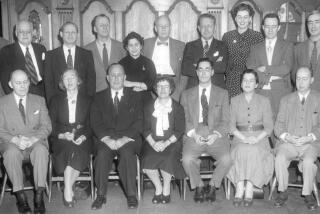‘Poison of darkness’ under microscope
- Share via
Pox
Genius, Madness and the Mysteries of Syphilis
Deborah Hayden
Basic Books: 380 pp., $27.50
*
For 500 years a specter haunted the marriage bed. It turned sex into shame, pleasure into guilt, painful life into often early death: the dreaded syphilis.
Believed to have been brought from the New World to the Old by Columbus and his crew, it burst upon the European consciousness in the French siege of Naples in 1495. From that time until 1943, when penicillin was used to cure it, it was the most feared of all the diseases begotten in the act of love.
Now it has been supplanted by AIDS (in the spread of which untreated syphilis assists) as the most gruesome possible consequence of the most joyful, necessary and natural of all human activities.
But the record of its history remains a window into how a transmittable little bacterium with a twisting propellant tail reacted with unsuspecting mankind and deeply affected both human behavior and mankind’s perception of itself.
Deborah Hayden, an independent scholar and marketing executive, peers through this window to bring us an imaginative if speculative account of the malady that Carl Jung called “the poison of the darkness.” She concentrates on those aspects of syphilis that so intrigued the 19th and early 20th centuries, the connection among syphilis, madness and genius.
Those connections were not much remarked on until the Romantic movement in the arts cultivated the notions of the solitary “genius” and his potential for possession by the diabolical. Faust became the dominant symbol, as profoundly expressed by Thomas Mann in his 1947 novel “Doctor Faustus,” in which a German composer, standing as an emblem for his nation, after a glancing encounter with an infected prostitute, makes a deal with the devil to compose brilliant music in exchange for his own dissolution and death.
The affinity of syphilis with so many other diseases -- it was named the “Great Imitator” by a 19th century doctor -- and its ability to produce in its victims moments of great excitement and creativity led to speculation about who, among the great men of the time, might have had syphilis. With the determination of a detective to whom no detail is too small to consider, Hayden combs the published sources and constructs her list.
“Today,” she writes, “there is general agreement that Baudelaire, Flaubert, Maupassant, Schubert, Schumann and Blixen [Baroness Blixen, the writer Isak Dinesen] had syphilis. Most concur about Nietzsche. But there is hot debate over Beethoven, Wilde, Joyce and Hitler. The question has been discreetly avoided for the most part with Mary and Abraham Lincoln, and it has not been considered seriously in the copious Van Gogh medical scholarship, where 152 diagnoses vie for attention.” Hayden devotes a separate chapter to each of these candidates.
Hayden says candidly that “the reader looking for proof in the contentious cases will find none. The old syphilologists knew that the Pox was identified by the cumulative weight of many ‘suspicion arousers’ -- that is, by circumstantial evidence.”
The burden of proof is of course made all that much harder by the shame the disease usually produced. Sufferers concealed it from their families and friends; discreet physicians left it off the death certificates.
Hayden’s book is thorough but, as she admits, “ ‘Pox’ will require careful attention on the part of the reader to keep track of information about the names and dates of syphilis. And the detective skill of a syphilologist will be required in deciding who did and who did not have it beyond a reasonable doubt.”
“Pox” requires a sound stomach to read through the symptoms of syphilis presented matter of factly in all their gore. Nevertheless the book holds the reader’s attention. Nearly all the people she writes about enriched human experience. How much of their talent was due to their disease, how much in spite of it? Though the answers are not knowable, the questions are worth asking. Hayden lays the groundwork for asking them.
More to Read
Sign up for our Book Club newsletter
Get the latest news, events and more from the Los Angeles Times Book Club, and help us get L.A. reading and talking.
You may occasionally receive promotional content from the Los Angeles Times.








